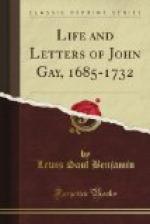“The Distrest Wife,” another of the posthumous plays, was a poor thing, and Swift was much annoyed that it was staged. “As to our poor friend, I think the Duke of Queensberry has acted a very noble and generous part,” Swift wrote to Pope, March 31st, 1734. “But before he did it, I wish there had been so much cunning used as to have let the sisters know that he expected they would let him dispose of Mr. Gay’s writings as himself and other friends should advise. And I heartily wish his Grace had entirely stifled that comedy, if it were possible, than do an injury to our friend’s reputation, only to get a hundred or two pounds to a couple of, perhaps, insignificant women. It has been printed here, and I am grieved to say it is a very poor performance. I have often chid Mr. Gay for not varying his schemes, but still adhering to those he had exhausted; and I much doubt whether the posthumous Fables will prove equal to the first. I think it is incumbent upon you to see that nothing more be published of his that will lessen his reputation for the sake of adding a few pounds to his sisters, who have already got so much by his death.” “The Distrest Wife” was produced at Covent Garden Theatre on March 5th, 1734,[17] and the Duke and Duchess of Queensberry were present at the performance. “To-morrow will be acted a new play of our friend Mr. Gay’s; we stay on purpose now for that,” the Duchess wrote to Swift on the previous day.[18] The play was published in 1743, and a second edition was issued in 1750. It was revived at Covent Garden, in 1772, with some alteration.[19]
In a humorous piece, “The Rehearsal at Goatham,” published in 1754, which was written probably about 1729, Gay ventilated his grievance against Walpole and the rest, a propos of the suppression of “Polly.” This was Gay’s King Charles’s Head, and he never forgave the Minister for this, or for not finding him a place. He made an attack on him, obvious to all, in “The Vulture, the Sparrow, and Other Birds,” which was included in his second series of “Fables"[20] that appeared posthumously in 1738.
* * * * *
The devotion of Gay’s friends survived his death, and they vied with one another in paying tribute to his memory. “As to himself, he knew the world too well to regret leaving it; and the world in general knew him too little to value him as they ought,"[21] the Duchess of Queensberry wrote to Swift on February 21st, 1733; and, later, she addressed herself to Lady Suffolk from Amesbury, on September 28th, 1734: “I often want poor Mr. Gay, and on this occasion extremely. Nothing evaporates sooner than joy untold, or even told, unless to one so entirely in your interest as he was, who bore at least an equal share in every satisfaction or dissatisfaction which attended us. I am not in the spleen, though I write thus; on the contrary, it is a sort of pleasure to think over his good qualities: his loss was really great, but it is a satisfaction to have once known so good a man.” Her affection endured until the end. Although she was then a very old woman, when “Polly” was produced at the Haymarket Theatre on June 19th, 1777, nothing would content her but she must be present. Within a few weeks, on the following July 17th, she passed away.




